Juicio RICO (2011-Presente)
Steven Donziger's Criminal Contempt Trial Postponed
Manhattan federal court Judge Loretta Preska, who had pushed to hold the trial, wrote that "Mr. Donziger and his counsel have employed virtually every conceivable tactic to stop trial from starting as long scheduled."
Law.com 10/09/2020
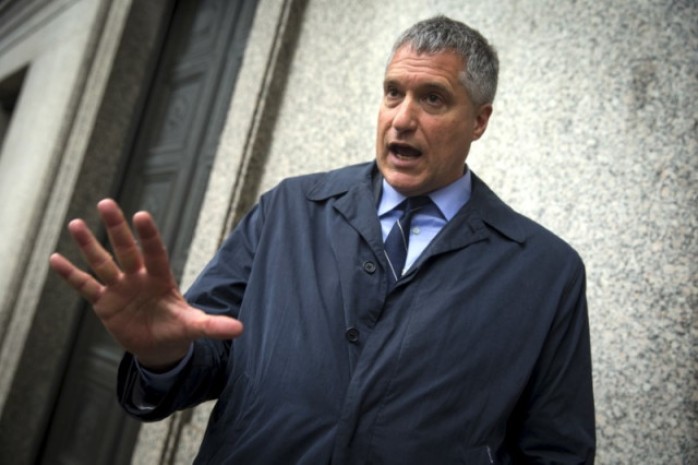
Steven Donziger's Criminal Contempt Trial Postponed / Foto: Juicio Crudo
Writing that the court finds itself in a “deeply disturbing” situation that is “largely the result of the machinations of Mr. Donziger and his legal team,” U.S. District Court Judge Loretta Preska of the Southern District of New York has postponed the contempt-of-court criminal trial of lawyer Steven Donziger.
The new date? Nov. 3, Election Day.
The bench trial had long been scheduled for Sept. 9. If convicted, Donziger, the environmental lawyer known for his longstanding and bitter legal battles with Chevron, could be sentenced to up to six months in prison.
In a five-page order, Preska, who throughout August denied all of Donziger’s numerous attempts to win a postponement of the in-person trial, wrote that “over the past few weeks, Mr. Donziger and his counsel have employed virtually every conceivable tactic to stop trial from starting as long scheduled.”
She then said that “regrettable as it is,” she had to grant a motion of one of Donziger’s lawyers, Andrew Frisch of Schlam Stone & Dolan in Manhattan, and thereby allow him to no longer serve as Donziger’s counsel.
In conjunction with granting Frisch’s motion, Preska was presented with the problem that no attorney left on Donziger’s sizable legal team who was eligible to represent him had had time to prepare for the contempt-of-court trial. And so she simultaneously ordered the trial “continued,” or postponed, to Nov. 3.
At the heart of the issue faced by Preska were two factors: One, that the lead lawyers expected to represent Donziger at trial, Richard Friedman of Friedman Rubin in Washington State and Zoe Littlepage of Littlepage Booth Leckman in Houston, had been disqualified from the case by Preska in August, though only after Donziger, who had the choice to keep them in the case, refused to waive his right to appeal the trial’s outcome; and two, that Frisch, who in late August was ordered to appear as counsel at trial for Donziger in Friedman’s and Littlepage’s stead, made multiple arguments to Preska about why he couldn’t ethically serve as counsel to Donziger because of unspecified “fundamental disagreements” he now had with Donziger that he said had irrevocably damaged their attorney-client relationship.
In her order, Preska did appoint Ronald Kuby, another lawyer who Donziger had identified as one that can now represent him at the trial, as the new trial lawyer while giving him about two months to prepare for a complicated trial that apparently he hadn’t yet begun preparing for.
Preska appeared perturbed in her Sept. 4 order to be postponing an in-person trial that for many months she and the special prosecutor appointed to the criminal contempt-of-court case against Donziger, senior litigation partner Rita Glavin of Seward & Kissel, had been preparing for. She blamed her having to delay the trial on Donziger’s legal team and, perhaps most pointedly, on Donziger.
Donziger was recently disbarred in connection with an $8.6 billion judgment he obtained against Chevron in Ecuador for its alleged refusal to clean up pollution-damage that its predecessor, Texaco, had allegedly strewn across an oil-rich section of the Amazon jungle. Donziger had brought the litigation, which lasted for nearly a decade, on behalf of 30,000 Indigenous Ecuadorians from that heavily polluted Amazon area. But he’s never been able to collect on the judgment. And in a later-filed Racketeer Influenced and Corrupt Organizations Act lawsuit lodged against him by Chevron in Manhattan federal court, he was found to have committed fraud in Ecuador in order to win the massive judgment. He was later charged with criminal contempt of court because, in the RICO case, he has refused to turn computer and cellphone information tied to his years of Ecuadorian litigation against Chevron.
Preska wrote that Donziger and his legal team had done all they could to put off his criminal trial, making maneuvers that she questioned sharply.
“First they moved for a continuance, and, when the court denied that motion, they moved for reconsideration,” she said. “Then at a Curcio hearing held after the court declined to reconsider the continuance order, Mr. Donziger refused to waive potential conflicts of interest affecting two of his lawyers, Richard Friedman and Zoe Littlepage, even though he had known of the potential conflicts since Mr. Friedman and Ms. Littlepage first appeared in this case and had never voiced any objection, even after the Government raised the issue in May.”
Continued Preska, “Because Mr. Donziger refused to waive the potential conflict, the court disqualified Mr. Friedman and Ms. Littlepage as counsel, which left Mr. Donziger with one lawyer, Martin Garbus, who refuses to attend trial in person, and another lawyer, Lauren Regan, who is purportedly not prepared to serve as lead counsel.”
Then, said the judge, “on September 2, Mr. Frisch filed the motion at issue here arguing that he cannot represent Mr. Donziger at trial on September 9 or on any later date because ‘fundamental disagreements’ have damaged their ‘relationship’ and ‘ability to communicate’ to a point ‘beyond repair,’” though Frisch has not detailed what those disagreements are.
Near the end of the opinion, Preska wrote that “there is no question that Mr. Frisch’s withdrawal will cause a major disruption to this case given that none of Mr. Donziger’s other lawyers is willing to lead the defense at trial starting next week and a government witness has already arrived in New York to quarantine for two weeks. Nevertheless, having weighed the countervailing factors, the court concludes that permitting Mr. Frisch to withdraw so that Mr. Donziger can have a trial lawyer with whom he is not at total loggerheads is the appropriate course.”
Donziger, meanwhile, has long been fighting against the civil RICO-case judge who leveled the contempt charges against him, Lewis Kaplan of the Southern District of New York, and against Glavin, the court-appointed prosecutor in the case. He has contended that Kaplan and Glavin may be doing Chevron’s bidding by going after him on the misdemeanor contempt-of-court charges, and that Kaplan seems to be motivated by an unexplained “vendetta” against Donziger.
In addition, Donziger and his counsel have claimed that Glavin and her fellow Seward & Kissel lawyers are conflicted and should be removed from the prosecution, because the firm has repeatedly represented Chevron, including in the recent past. They further argue in court filings that they believe Kaplan was aware of Seward & Kissel’s past representation of Chevron when he handpicked Glavin as the contempt-of-court special prosecutor after he levied contempt charges against Donziger.
In an emailed statement to the Law Journal, Donziger said he was happy that Preska had decided to delay his contempt of court trial, and he vowed to continue to fight, including by trying to get lifted his own house arrest, as ordered by the court more than a year ago.
“We are gratified that the court finally conceded the obvious and postponed what would have been a trial severely lacking in fundamental fairness where I would not have been adequately represented by counsel,” he said. “Whatever the date, we will continue to fight for my trial to be conducted consistent with the Constitution: with a new and unbiased judge, in front of jury of my peers, with a disinterested prosecutor who has no ties to Chevron.”
“I will soon be moving judicial authorities to immediately release me from a pretrial home detention that now has lasted more than twice as long as the maximum sentence allowed should I be convicted,” he added. “This detention might serve Chevron’s interests in preventing me from working on enforcement of the Ecuador judgment, but it is grossly unfair and a violation of my due process rights under the Constitution and international law.”
Glavin, the special prosecutor and Seward & Kissel partner, could not be reached for comment.
Fuente OriginalNotas relacionadas
-
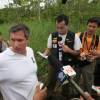 Donziger On Track For June Criminal Contempt Trial
Donziger On Track For June Criminal Contempt Trial -
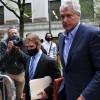 Inicia juicio contra abogado que demandó a Chevron por contaminación en Ecuador
Inicia juicio contra abogado que demandó a Chevron por contaminación en Ecuador -
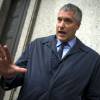 Donziger Denies NY Judge's Criminal Contempt Allegations
Donziger Denies NY Judge's Criminal Contempt Allegations -
 Further Details Of The Contempt Motion Against Steven Donziger
Further Details Of The Contempt Motion Against Steven Donziger -
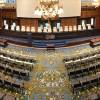 Hace 5 años, Tribunal de La Haya falló a favor de Chevron
Hace 5 años, Tribunal de La Haya falló a favor de Chevron -
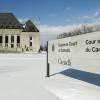 Hace 4 años, Canadá les cerró las puertas a los abogados detrás del fraude contra Chevron
Hace 4 años, Canadá les cerró las puertas a los abogados detrás del fraude contra Chevron
